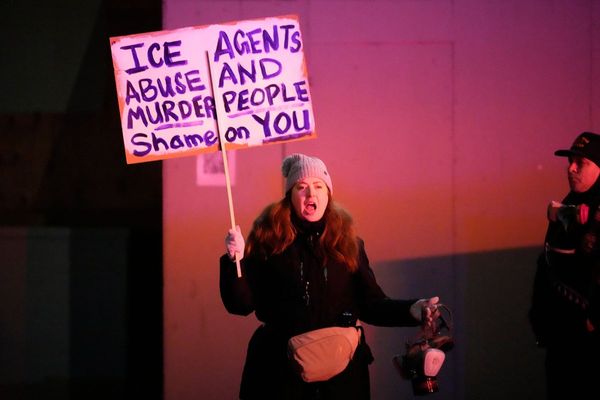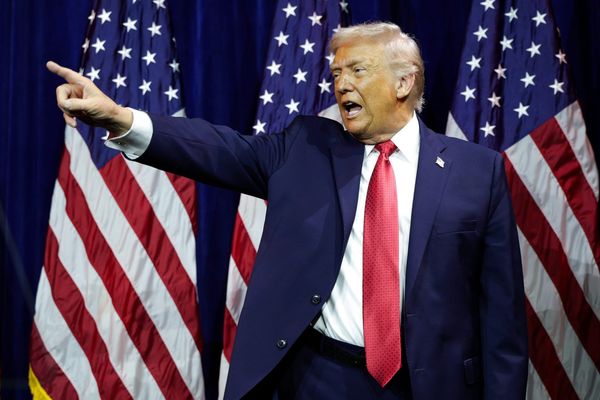
For many years, Shane McCrae would describe the experience of his childhood and adolescence while assiduously avoiding use of the word “kidnap”. McCrae grew up in the 1980s, when, as he observes, kidnap was one of those “faddish” crimes that briefly seized the public imagination in the US after a series of high-profile child kidnappings. “In the 90s, gang crime is something we were obsessed with. And in the 80s, kidnapping was a thing that was really on the mind of folks a lot. I remember thinking: what would happen if that happened to me? Not really understanding that I was in the midst of one. It had already happened to me.”
McCrae’s story is complicated and traumatic, and he has spent the past five years fully confronting it for the first time by writing his memoir, Pulling the Chariot of the Sun. The book, which is told in jagged, circular fragments familiar to anyone who has read McCrae’s poetry, tells of how, in 1979, when he was three, McCrae was dropped off by his father at his maternal grandparents’ house in Salem, Oregon, for what was supposed to be an overnight visit. When McCrae’s father, Stanley, turned up on Monday morning to fetch his son, he found – incredibly – an empty house with a for sale sign in the yard. McCrae wouldn’t see his father again until he was 16 years old.
The pertinent detail here is that McCrae’s mother and maternal grandparents were white, and his father, who was McCrae’s sole carer after he and McCrae’s mother split up, was Black. The kidnap, he says, was the culmination of a series of moves on the part of his grandparents that included withholding his father’s name from his birth certificate – McCrae was given his maternal grandfather’s name, Baker – and registering him as white, not mixed race.
“They kidnapped me to get me away from Blackness,” writes McCrae and, in the years following the kidnap, the only time race was mentioned in the house was during one of McCrae’s grandfather’s racist tirades. They told him his skin colour was a result of the fact that he “tanned deeply, easily”. His grandfather referred to people of colour – this was the polite version – as “them”, but in some ways, says McCrae, his grandmother’s delusions around race were more painful. “She thought that marking me down as white would be some kind of advantage in life,” he says, smiling. “Not quite sure how she envisioned that playing out.”
More than four decades later, McCrae, now 47, is living in upper Manhattan with his wife and 13-year-old daughter (he has a 29-year-old daughter from a previous relationship), and teaching creative writing at Columbia University. He has published 10 volumes of poetry, including Sometimes I Never Suffered, which was shortlisted for the 2020 TS Eliot prize, and In the Language of My Captor, a finalist for the 2017 National book award. McCrae’s poetry is lyrical, repetitive, riffing on motifs that snag the reader and draw them into his obsessions. In the memoir, this style manifests in a stuttering journey towards self-definition – every step forwards entailing a dragging back over the same ground and its central question: “Am I misremembering it?”
Beyond the violent dislocation of the kidnapping itself, this is the true horror of McCrae’s experience: the years of denial and misinformation that followed. His grandparents told him his father didn’t want him and never wanted to hear from him again. His mother, Denise, whom he saw only intermittently, colluded – or at least, failed to challenge – this story until much later, when she would explain to McCrae that, as a young mother totally dominated by her parents, she too had been at their mercy. (Denise never lived with McCrae and his grandparents, but would drop in, occasionally.) And they never alluded to or acknowledged the fact that McCrae was Black.
McCrae knew it, of course; when his grandfather screamed the N-word apparently at random, McCrae felt the true direction of his anger. And he knew it when, as the only Black kid in his elementary school class, other kids ran up to him in the playground and repeatedly knocked him down.
If these were things McCrae knew intimately, it was knowledge that existed at a level he couldn’t reliably access. By the time he wrote his memoir, he was decades into reconciliation with his father and was familiar with the broad outline of what had happened to him. But the gaslighting was so deeply embedded – as McCrae puts it in the book, as a child, he lived inside the contradiction, “what I knew, I couldn’t know” – that, he says, “writing the book was the first time I’ve really thought about it very hard. In that sense it has been very distressing psychologically and has caused a lot of personal unhappiness. But I’m glad that I wrote it.”
The state of simultaneously knowing and not knowing something is the cornerstone of trauma, and McCrae writes of blocking out the memory of his grandfather beating him. In fact, Morris Baker wasn’t even his grandfather; he was his grandmother’s fifth husband and no blood relation to McCrae. He writes of his mother, Denise, telling him that as a child, her stepfather had beaten her, too.
The violence continued until McCrae was 14, when his grandmother left Baker, although to think of her as his victim frustrates McCrae immensely. In the book, he writes, “my grandmother had watched my grandfather kill me since I was three”. Now, he says, “I never got the impression that she did not have a great degree of power in that relationship. Maybe most of the power. I would point out that before she kidnapped me, she took my mother from her father. The odds are that it was her idea to begin with.”
It is curious, he says, how powerfully people need to put some softer spin on his grandparents’ motivations. “People want to find a way to justify the behaviour of at least one of my grandparents; to make that OK. You know: maybe they were just doing what they thought was best? Which I find – it’s very shocking.”
It’s a dynamic that he experienced some version of as a child, a reflex towards normalising and rationalising violent behaviour. “The kidnapped child must first and above all protect his kidnappers from himself,” he writes. “It must not occur to him to tell anyone he was kidnapped, and so it must not occur to him that he was kidnapped.”

As a child, he was frightened of his grandfather but he was more frightened of being taken away from him. “It seems like a contradiction,” says McCrae. “But because the large psychic injury from which so much of my life seems to have flowed happened when I was taken from my father – and despite the fact it’s my grandparents who did it – I had a great terror of it happening again.”
Growing up, says McCrae, he would sleep fully dressed, ready to run, and developed an obsession with survival. “This sense that everything could disappear at any moment – all of this has to do, I’m certain now, with the kidnapping. The terror of that injury being inflicted again was considerably more significant than the constant sense of danger and threat that I felt being in that house. Which was just my day-to-day life. People get used to all kinds of things.”
How to write about all this? How to convey the immensity of his efforts to recognise his childhood for what it was? McCrae’s passage out began as a teenager when, one day, he realised that he didn’t hate his father. He doesn’t know what triggered it. He says he just knew, suddenly, that the foundations of what he’d been told were unreliable. With that understanding in place, he started to question the story he’d been given about his abandonment.
Slowly, he allowed himself to be curious about the man. He had his name – Stanley McCrae. He had a few disjointed memories of early childhood, none of them traumatic. And he had the local phone book. After years of moving around the country, from Oregon, to Texas, to California, McCrae and his grandparents were back living not far from where he had lived with his father. One day in 1992, when McCrae was 16, he looked up Stanley’s name in the phone book. And there it was.
The confidence to make the call was boosted, perhaps, by two influences in McCrae’s life at the time: skateboarding and, increasingly, poetry. Both gave him a sense of being in a world of his own, free from the violent influence of his grandparents. Both contained the idea, he says, “that you can lose yourself. When you’re making a poem, even when what you’re writing is terrible, or graphically violent, or really sad, or emotionally wrenching – there’s almost no subject that’s so terrible that you can’t feel a joy in writing about it. And I think skateboarding has that same effect for someone who really loves it. You just kind of disappear in the doing of it.”
It was McCrae’s experience as a poet that, ultimately, helped him to find a way to write about his youth without being paralysed by the fear that he was telling a story that he had no right to tell. After leaving school, he went to community college, before winning a place on the prestigious master of fine arts course at the Iowa writers’ workshop. Briefly, he considered becoming a lawyer, before accepting that poetry was where he belonged.
McCrae’s first full-length collection, Mule, was published in 2011 and explored the process of coming into being, a recurring theme in his work that, in poetic form, managed to bypass his own internal censorship. “A poem tends to benefit from not too much deliberation beforehand,” he says. “There’s no context according to which you need to give yourself permission except in so far as to write at all. The more you think about the writing you’re doing, the more the writing you’re doing is going to suffer.”
And yet, McCrae is still occasionally blindsided by the lies his grandparents put in his head. The memoir ends before he meets his father, although we understand from the beginning that a relationship exists between the two. When McCrae asked Stanley why in 1979, when the kidnapping took place, he didn’t go to the police, his father explained to him how impossible it would have been for a Black man in Salem, Oregon to challenge a white couple whose name was on McCrae’s birth certificate. (Not long after their reunion, McCrae changed his name from Baker to McCrae.)
Tentatively, he began to use the word “kidnap” in relation to his experiences. But it was a long time, he says, “before I really internalised it. In an abstract way, I was aware it had happened to me, but I couldn’t really. The other day I did an interview and there was a fact-checking process and someone asked, were your grandparents ever charged? And the reflexive thought I had was that’s ridiculous, of course not, what do you mean? And I had to stop and think about it for a second; and think, no, that’s a perfectly reasonable question. It is a very slow process acclimatising oneself to a harm with which one has lived one’s entire life.”
This harm can manifest as an internal pressure, a sense of the known unknown – McCrae still has areas of memory blackout – bubbling up in indirect ways. “The most visceral experience of memory loss is the feeling that the memories might return,” he says. “That’s the most difficult feeling in relation to it.” But, he says, “my defences against it are very practised, because I’ve been doing it for decades. And so when I start to get that heavy feeling of sadness, my brain starts working to stop it happening.
“When I was in college, I had this feeling for about a year when I just wanted to cry all the time. I was really conscious of it, but I didn’t know why. There didn’t seem to be any precipitating event. And just as strong as the feeling that I wanted to cry all the time, was the feeling that I wasn’t crying at any time – the feeling that something was holding it back. And that’s the same thing that I have in regard to confronting these difficult memories.”
One aspect of the story that hasn’t been a struggle for McCrae has been the process of undoing the effect of his grandparents’ racism. “I think I always understood that their way of thinking was wrong. And while I lived this sense of feeling both Black and not Black, at a certain point, when I was 20, I went through a phase where I was very consciously trying to embrace my Blackness, and it didn’t feel difficult. I was reading a lot of Black thinkers and I was listening to a lot of music by Black musicians and trying to figure out what it meant to be Black. It was more exciting and exploratory than feeling there was something in there that I needed to repair.”
McCrae’s maternal grandparents are both dead. His mother, Denise, is reading the book and he doesn’t know what she thinks about it. “I think that her sense of these events is very complicated. I think she might feel immensely regretful about it, but the size of the regret is, perhaps, paradoxically so big that she can’t really acknowledge her role in it.”
The life he leads and his success as a writer, meanwhile, is something he can never entirely get used to. “I am constantly in a state of amazement that I get to live the life that I do. I think my family is happy; we live in Manhattan, a seven-minute walk from work. And I get summers off! I never lose the awareness of the unlikeliness of it. And of course that means I worry about it, too.” Mainly, however, “I think about it with gratitude. That things have worked out even as well as they have: the odds against it are astronomical.”
• Pulling the Chariot of the Sun will be published by Canongate on 14 September (£16.99). To support the Guardian and Observer order your copy at guardianbookshop.com. Delivery charges may apply.







